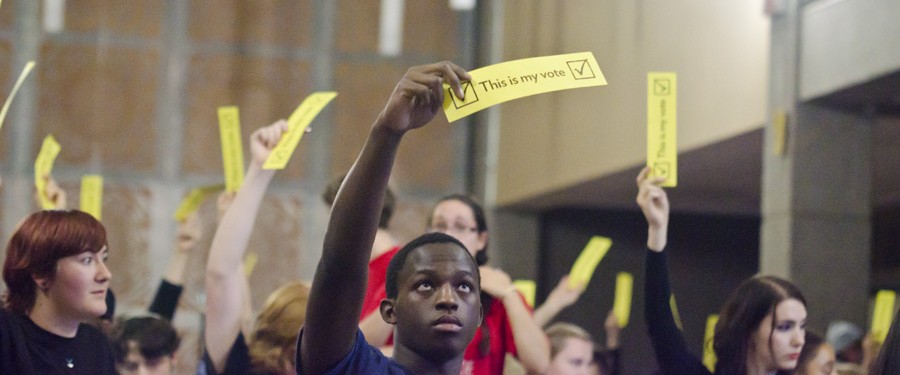Despite efforts to make the General Assembly (GA) of the Students’ Society of McGill University (SSMU) on Oct. 15 more accessible to students, the assembly lost quorum after passing two motions.
The revamped GA showcased several new features, including the introduction of online ratification. Although motions still need to be passed by the assembly, they must now also be ratified through an online vote that represents at least 10 per cent of SSMU’s constituent. Voting on yesterday’s motions will be open for seven days, from Oct. 16 to Oct. 23. Results will be announced on the last day at 5 p.m.
The GA was also live-streamed, and featured a “mood watcher,” to whom students could send text messages anonymously if the debate made them feel uncomfortable, or if they thought the debate was moving in an unproductive direction.
The use of clickers to speed up voting was among the intended reforms pioneered by the SSMU executives. However, SSMU President Josh Redel said that the order for clickers fell through. SSMU will be looking into a text and mobile app-based audience engagement system for the next GA.
Despite the alterations, the GA lost quorum after voting on just two motions. However, Redel said he was pleased with the GA, and thought the mood watcher and use of social media were effective.
“[Low participation] might just be a reality of McGill,” Redel said. “I’m intrigued to know how much [improvements to the GA] could change that culture, [but] I think people enjoyed this, and hopefully that means that the next one will have more people.”
One student, who asked to remain anonymous, liked the idea of getting students involved through social media, but questioned the requirement of online ratification.
“After the first motion passed I think we all realized that… our participation doesn’t mean as much as it used to,” she said. “That’s disappointing.”
Redel said that ballots for online voting would be finalized in time for polls to open by noon today. He added that there will be additional features to facilitate students’ understanding of the motions as they vote, such as videos of recorded debate, and hyperlinks in the ballot questions.
Motions
The two motions passed as binding resolutions concern the installation of a bouldering wall in the SSMU Building, and the renaming of the SSMU Breakout Room to the Madeleine Parent Room, in honour of a recently deceased McGill alumnus who advocated for gender equity.
Since the assembly lost quorum for all subsequent votes, the GA acted as a consultative forum for the remaining motions, which were therefore passed as non-binding resolutions to be discussed at SSMU Council.
One of these was a motion to renew SSMU’s mandate to support accessible education. Last year, the mandate meant that the society opposed the proposed provincial tuition increase of $1,625 over five years, which the newly elected Parti Québécois cancelled soon after their election to provincial parliament in September.
SSMU Vice-President External Robin Reid-Fraser pointed out that SSMU has supported this policy for a long time and that the role of this mandate this year will depend on the development of the student movement.
“The context of the student movement right now is quite different, because we have a change of government, [and] the tuition hike that students were striking about has been cancelled—at least for now,” Reid-Fraser said.
Some students, however, suggested that SSMU should not renew the mandate, pointing to the tension that arose surrounding the issue last year, as well as the Arts Undergraduate Society’s ultimate vote against joining the student strike.
“The last [time] that we had [a policy] about supporting accessible education, we had a previous Vice-President External spend several thousands of dollars of students’ money on a cause that they did not support, and that ultimately they voted down,” Harmon Moon, U3 history, said.
The greatest amount of debate came from a motion mandating SSMU’s opposition to Canadian military involvement in Iran.
“I want to point out the hypocrisy of this motion in condemning McGill or opposing any ties that the university has to weapons research, but not condemning Iran for engaging in the same kind of research,” Beni Fisch, one of the founders of the Moderate Political Action Committee (ModPAC), said.
“I understand that this is a very complicated issue,” Reid-Fraser, one of the movers of the motion, said. “In general, this [motion] is very much opposing war because it is something that can affect many innocent people’s lives, not just on the Iranian side.”
Both motions were passed by the assembly and will be discussed at SSMU Council.
Additional motions passed by the assembly as a consultative forum resolved that SSMU oppose Plan Nord and further development of the Canadian oil sands, as well as lobby McGill to divest from companies engaged in activities concerning these issues.







